Bibliothèque
Toutes les ressources
2561 – 2580 sur 2608 résultats
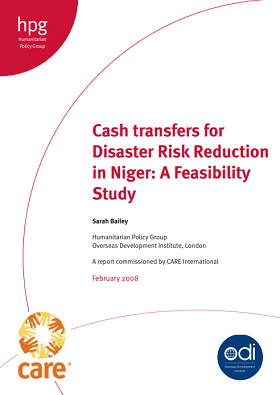
Cash Transfers for Disaster Risk Reduction in Niger: A Feasibility Study
Case Study
This HPG study report, commissioned by CARE, examines the appropriateness, cost-effectiveness and feasibility of cash transfer programming as part of a disaster risk reduction (DRR) strategy in Niger. It gives a general livelihood context of Niger and then looks at the feasibility and appropriateness,...

Practitioners’ Guide to the Household Economy Approach
Guidelines and Tools
This guide is aimed at those carrying out household economy approach (HEA) assessments, and is intended to serve as both a refresher guide for experienced practitioners and a set of reference reading materials to accompany formal trainings for new practitioners. The Practitioners’ Guide is presented as...

Cash Transfers in Lesotho: An evaluation of World Vision’s Cash and Food Transfers Pilot Project
Report
The Cash and Food Transfers Pilot Project (CFTPP) was designed and implemented as World Vision‟s contribution to the humanitarian response to the 2007/08 food crisis in Lesotho. This crisis was triggered by Lesotho‟s worst drought in 30 years, which reduced maize yields by 42% and left an estimated...

A summary of the British Red Cross cash grants for livelihood recovery in Aceh, Indonesia
Case Study
From April 2005 to June 2008, the British Red Cross Society (BRCS) disbursed more than USD 10 million in cash grants directly to over 10,000 tsunami-affected people in Aceh to support the recovery of their predominantly agriculture and fisheries-based livelihoods. This study draws lessons from the rich...
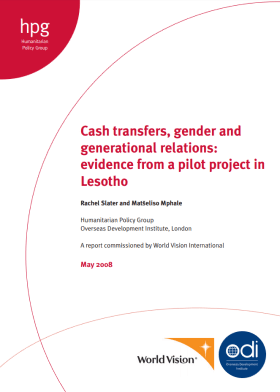
Cash Transfers, Gender and Generational Relations: Evidence from a Pilot Project in Lesotho
Report
Food aid has been the main response to repeated and protracted humanitarian crises in Lesotho since 2002, and during that time it has also been the major part of World Vision’s emergency responses. Along with the government, donors and NGOs, World Vision is increasingly interested in the role that cash...

The Use of Cash Grants in UNHCR Voluntary Repatriation Operations: Report of a lessons learned workshop
Report
On 4 April 2008, UNHCR’s Division of Operational Services and the Policy Development and Evaluation Service (PDES) co-sponsored a workshop on the use of cash grants in UNHCR repatriation operations. A total of 25 UNHCR staff members participated, together with six experts and researchers from Oxfam GB,...

Case Study of the Poultry and Grape/Raisin subsectors in Afghanistan: Guided case study in value chain development for conflict-affected environments
Report
Is the value chain approach effective for restoring market-based economic activity in a severely affected post-conflict environment?. The goal of this study is to gather empirical evidence to answer this question, looking at the role of the value chain approach in the work of USAID’s Rebuilding...

Market Assessment and Analysis: Learner’s notes
Guidelines and Tools
This document presents the “Learner’s Notes” that accompany a distance learning course on Market Assessment and Analysis. The course illustrates how markets operate and how they relate to and affect food security and vulnerable households. It describes market components and how they function...

Market Development in Crisis Affected Environments: Emerging lessons for achieving pro-poor economic reconstruction
Report
This paper documents practitioner experience and innovations in market development for income generation and livelihood security in crisis and post-crisis settings. War and natural disaster have devastating impacts on people’s ability to generate income and secure a sustainable livelihood that can...

A Synthesis of Practical Lessons from Value Chain Projects in Conflict Affected Environments
Report
Over the last year, at the behest of USAID, 10 organizations captured results and lessons learned from projects that used value chain programming in conflict-affected environments. The goal of this paper is to extract larger lessons that emerge from these implementing organizations and the programs they...
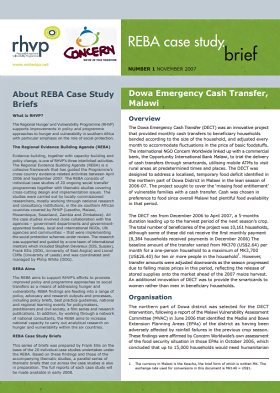
Dowa emergency cash transfer, Malawi
Case Study
This case study looks at the innovative Concern Worldwide project which provided monthly cash transfers to beneficiary households using smartcards utilising mobile ATMs to deliver the cash. The report examines the choice of programme delivery mechanism, the targeting of beneficiaries, coordination, cost...
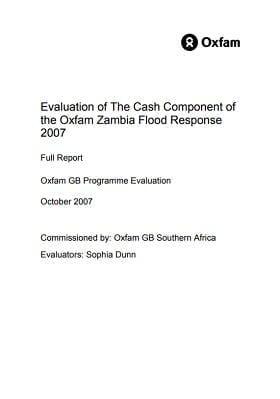
Evaluation of The Cash Component of the Oxfam Zambia Flood Response 2007
Report
Oxfam Zambia responded to the flooding in Western Province by providing unconditional cash grants to 2100 households over a four month period (May – August 2007) in two wards of Mongu District Ushaa and Lumbo. The grant was designed to prevent malnutrition and harmful levels of asset depletion and...
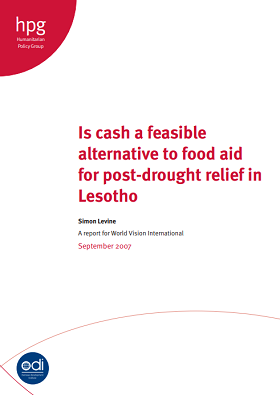
Is cash a feasible alternative to food aid for post-drought relief in Lesotho
Case Study
This report summarises the findings from a study undertaken to assess whether or not a cash based response by World Vision to the current drought in Lesotho would be an appropriate and feasible response. It looks at the potential problems which could affect the feasibility of cash interventions and...
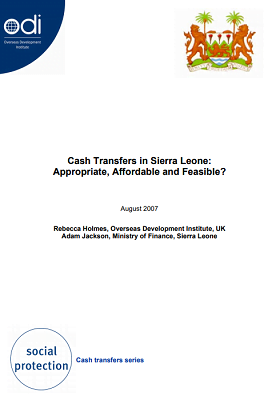
Cash transfers in Sierra Leone: Appropriate, affordable and feasible?
Case Study
This paper is one of a series of outputs from ODI’s research study (2006–09) “Cash Transfers and their Role in Social Protection”. The study aims to compare cash with other forms of transfers, identifying where cash transfers may be preferable, the preconditions for cash transfers to work well,...
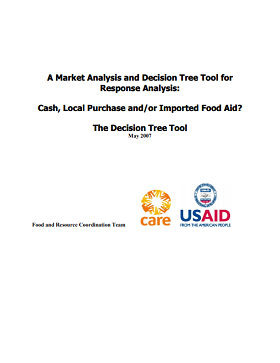
A Market Analysis and Decision Tree Tool for Response Analysis: Cash, Local Purchase and/or Imported Food Aid?
Report
This document provides the Decision Tree Tool, which is to be used for the analysis of response options in a food insecurity context – cash, local purchase or imported food aid (see MIFRA paper). The framework is kept simple for ease of communication with a sequence of specific questions divided into 2...

The Use of Cash/Vouchers in Response to Vulnerability and Food Insecurity: Case study review and analysis
Report
This document summarizes the major characteristics and outcomes of 27 recent pilots, projects or programs worldwide that made use of cash and/or vouchers to provide benefits to people in need. The concluding section attempts to synthesize the commonalities and contrasts among those cases, as a first step...

Mise en oeuvre des interventions monetaires: un manuel pour les professionels du terrain
Guides et outils
Ceci est un guide complet de la théorie et la pratique des interventions monétaires, couvrant les subventions en espèces, bons/coupons, et l’argent contre le travail. Il comprend également des outils pratiques, y compris des exemples de questionnaires, enquêtes de marché, les cartes de...
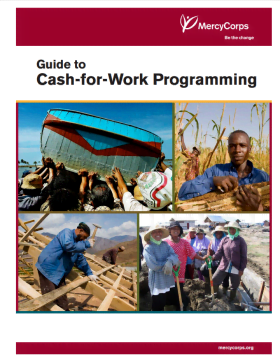
Guide to Cash-for-Work Programming
Guidelines and Tools
Cash-for-Work is a short-term intervention used by humanitarian assistance organizations to provide temporary employment in public projects (such as repairing roads, clearing debris or re-building infrastructure) to the most vulnerable segments of a population. The methodology is relatively new, but its...
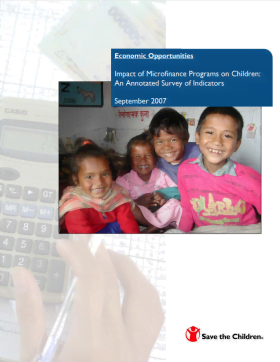
Impact of Microfinance Programs on Children: An annotated survey of indicators
Report
The purpose of this study is to ascertain what indicators have been used by multisectoral, child-focused non-governmental organizations (NGOs), microfinance practitioners and social performance researchers to assess processes that address children’s concerns in operations and the impact of microfinance...
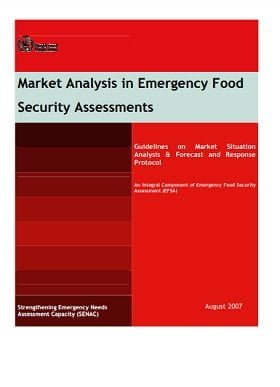
Market Analysis in Emergency Food Security Assessments
Guidelines and Tools
This document provides a generic overview of market analysis as an integral part of an emergency food security assessment. The main objective is to provide a basic understanding of markets, including how to gather market information, conduct a situation analysis, and
interpret the analysis to inform...


